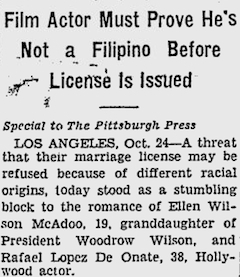The Flipside of Nonsense
 There is an interracial romance at the heart of my next book, so I've spent appreciable time researching the question of how such couples were regarded in the early 1970s. As is typically the case, that line of inquiry has piqued my interest in a tangential matter: the creation of anti-miscegenation laws specifically targeted at Filipinos. Much to my surprise, some of the nation's more traditionally open-minded states enacted such laws in the early part of the 20th century. California is one prime example; after a 1930 court case found that the states anti-miscegenation laws did not specifically bar couplings of Filipinos and whites, the legislature acted with extreme alacrity to correct that "oversight." The result was stories like the one cited in the newspaper clipping above, in which Filipinos were compelled to prove that they lacked "Malay blood" before obtaining marriage certificates.
There is an interracial romance at the heart of my next book, so I've spent appreciable time researching the question of how such couples were regarded in the early 1970s. As is typically the case, that line of inquiry has piqued my interest in a tangential matter: the creation of anti-miscegenation laws specifically targeted at Filipinos. Much to my surprise, some of the nation's more traditionally open-minded states enacted such laws in the early part of the 20th century. California is one prime example; after a 1930 court case found that the states anti-miscegenation laws did not specifically bar couplings of Filipinos and whites, the legislature acted with extreme alacrity to correct that "oversight." The result was stories like the one cited in the newspaper clipping above, in which Filipinos were compelled to prove that they lacked "Malay blood" before obtaining marriage certificates.
One state that resisted the trend was Washington, where Filipino anti-miscegenation laws were defeated in both 1935 and 1937. In the latter instance, opponents rallied around an op-ed that focused primarily on the fallacious science of the fearful:
In March of 1937, the Philippine Advocate published an article by Catelino Viado, a Filipino author, claiming that there was "no race deterioration in mixed marriages." Here, the argument was based not only on American ideals but on the fallacy of racist pseudoscience in claiming that intermarriage would produce "race deterioration." In making his point, Viado used the example of plant and animal hybridization to produce superior natural products, arguing that the notion of "race deterioration" from mixed marriages was a product of "petty jealousy and race sentimentalism" and could potentially improve the human race.
I like how Viado turned the common pseudoscientific argument on its head, in a manner that probably never occurred to people who benefitted from hybridization in their daily lives. Makes me wonder how much more harmonious a world we could live in if scientific literacy were ratcheted up a mere notch or two. There is a certain amount of wisdom and perspective that comes from understanding our relative lack of uniqueness in the grand scheme of life.




